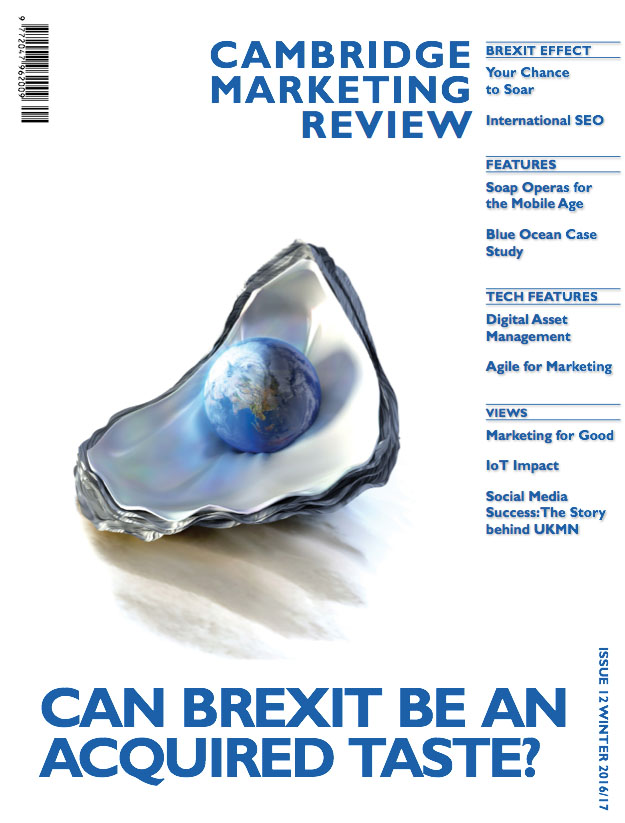Perfecting the art of ‘search engine optimisation’ is a job well done and a big tick in the marketer’s skillset – but how about making sure your website ranks highly around the world? If you’re marketing across borders, check out some clear international SEO advice from expert Ellie Morgan.
For marketers, measurability is a must – they need to know what’s working and why, or why not. A website needs to attract visitors, who will hopefully convert to customers. Hence, the process of optimising a website for it to rank better in search engines – such as Google – and thus drive visitor traffic, is vital.

Download a pdf of this issue of the Cambridge Marketing Review, here.
But what about search engine optimisation across borders? How can organisations and companies that are operating internationally ensure their websites are measuring up with, for example, Yahoo Japan, Baidu in China, Russia’s Yandex or Naver in South Korea?
It’s a complicated issue, but one that is addressed by SEO expert Ellie Morgan (pictured), whose article ‘Discovering International SEO’ chops the subject up into digestible bite-sized chunks in the latest edition (number 12) of the Cambridge Marketing Review.
International SEO: will a translation tool do the job?
Well, there’s a bit more to it than that. In her article, Morgan says: “Just 27% of internet users are English-speaking.
So, a very common question about language is ‘can I just use Google Translate?’ Google created this tool for online translations so, yes, you can use Google Translate, but don’t expect good results from it.
“
Using a proper translation will resonate far better with your chosen audience and will give you the opportunity to tailor your language to the local users. Using a translation specialist will also mean that you will get the best local dialect translations. Going down the route of using a co-worker or friend to translate a piece of content for you sometimes won’t account for using proper dialects, which will again resonate so much better with your audience.
She adds: “There is also an argument to say that as Google Translate is technically an automated translation, it therefore violates Google’s own rules about using automated text generators. There is some argument to say that Google may read these translations as spammy content.”
And then there is the issue of Google penalties for duplicated content . . . is a translated version of your content a duplicate? Morgan calls this ‘the elephant in the room’, and adds: “If you have three pages with three separate translations of the same content, this will not be classed as duplicate content, because the content itself is different content once translated. Again, this is where Google Translate becomes a bit of a grey area as the content is translated one way and could in theory be translated straight back into the same piece of content and is therefore a duplicate piece of content.”
Morgan – head of digital marketing at Studio 24 – summarises: “If you optimise for Google you are pretty safely optimised for all search engines popular in Europe and the US. If you start targeting countries using other search engines such as Yandex, Baidu, Naver, etc, you might find the rules change slightly and will find yourself having to become familiar with each search engine and, sometimes, their limitations.”
Those differences include Japan’s Yahoo preferring higher keyword densities, China’s Baidu rating meta tags but being less concerned about inbound links and Russia’s Yandex penalising use of too many pop-ups and banners on sites.
Marketers should also be aware that social media habits differ around the globe. Just as Google (although the world’s biggest player) is not the only search engine, so Twitter is not the most popular social media platform everywhere – China’s three top social networking sites are Qzone, RenRen and Pengyou and Chinese censors have actually blocked access to western social sites including Facebook, Twitter and Youtube.
Canada’s most popular social networking site is Facebook with 72% of the online population using it and secondary networks are Myspace and Bebo. Brazilians favour Orkut, which is Google-owned and leads the market, but Twitter is very popular – only Indonesia and The Netherlands have higher penetration levels, Morgan reports. Brazilians are generally very social, with more than 90% of internet users active on social media sites.
She adds: “In Japan, Facebook has failed to make much of an impact. Gree has 24 million users and is the most popular social networking site in Japan, Mixi is another top social site, Twitter has had huge success in Japan – Japanese was the first language into which Twitter localised its interface. The Japanese are more advanced in their use of mobile and are more likely to access a social networking site from a mobile device than desktop.
“And in Poland, the social site Nasza Klasa is still the most popular, but Facebook is showing large growth, with other social networks being left behind.”
Top tips for international and BigCommerce SEO success:
- Optimise your website, use the best URL structure you can and use Google Search Console to target geographically.
- Do your market research, find out which search engines you need to optimise for and HOW to optimise to perform best in these search engines.
- Find out about your users, not only their search habits but their social habits. Much like search engines, there are many other social media platforms available!
- Use proper language and translations for content and keywords and be consistent, the clearer you are about the purpose of your content, the easier it will be for search engines and their users to understand your purpose.
- Measure your results, use Google Analytics on your site to record data, track your keywords to measure how well your website is ranking. Use tools available for each social platform and search engine to get the best data.
Read also:
Crucial metrics to add to your SEO campaign
Web analytics and safeguarding your site in the ‘age of impersonator bots’








Leave your thoughts